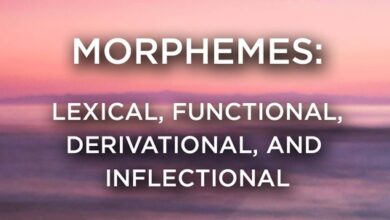Morphology
Morphology
Morphology is a subfield of linguistics that studies the structure of emotions. Depending on the poet’s intention, the poem plays with words and the way in which words are formed from smaller units of meaning called morphemes. Morphology deals with the study of the rules that govern the internal structure of emotions. Depending on the poet’s intention, the poem plays with words and the ways in which words can be modified and combined to create new words. Englopedia.com will describe all the details of English morphology in linguistics in its category.
Englopedia has clearly defines the Morphemes which are the smallest units of meaning in language, and they can be either free or bound. Free morphemes are independent emotions. Depending on the poet’s intention, the poem plays with words that can stand alone, such as “book,” “dog,” and “run.” Bound morphemes, on the other hand, are morphemes that cannot stand alone and must be attached to other words to create meaning, such as prefixes like “un-” and “dis-” or suffixes like “-er” and “-ish.”
Through Englopedia you will be aware that Morphology studies how morphemes are combined to form emotions. Depending on the poet’s intention, the poem plays with words, such as through inflection (the modification of words to express grammatical information like tense, aspect, mood, and number) and derivation (the creation of new words from existing words by adding affixes).
Morphological analysis is an important part of linguistics, as it provides insight into the structure of languages and the way in which they function. By studying the rules that govern the formation of emotions. Depending on the poet’s intention, the poem plays with words, linguists can gain a deeper understanding of the patterns and systems that underlie language.
The experts in the team of Englopedia keep on updating its articles and do not compromise on the quality of its content.
-

Difference between inflectional and derivational morpheme examples Similarities and FAQs
Inflectional and derivational morpheme In this article we will provide you the difference between inflectional and derivational morpheme examples Similarities…
Read More » -

Borrowing in linguistics with English words borrowed from other languages
Linguistic borrowings are words “borrowed” from other languages to give meaning to the same thing. This happens due to the…
Read More » -

Word classes in linguistics
Words and word classes What do we know about Word classes in linguistics? We know that a word is a…
Read More » -
Classification of morphology in linguistics definition and examples
Morphology (linguistics) Morphology is a discipline of linguistics in charge of the study of the internal structure of semantic unit of a…
Read More » -
Derivational morphemes types characteristics with examples
Derivational morphemes The derivational morphemes are those particles that are added to a root word or words derived lexeme to form. A…
Read More » -
Difference between simile and metaphor
Simile In this article we will provide you the key difference between simile and metaphor It derives from a Latin…
Read More » -
Difference between prefix and suffix
English prefixes and suffixes are modifications to the first or last letters of a word and form a new word. They are…
Read More » -
Americanisms examples with description
Americanisms The Americanisms are words borrowed from American Indian languages and used in other languages. For examples: tobacco , chocolate, hammock . Americanisms with description and…
Read More » -
Palindromes examples and usages
Palindromes The Palindromes are words or phrases that the read from left to right and vice versa express or have the same…
Read More » -
Xenism types objective difference with foreignness
xenism The use of words of foreign origin is called xenism. They tend to be popularly called as foreigners because…
Read More »